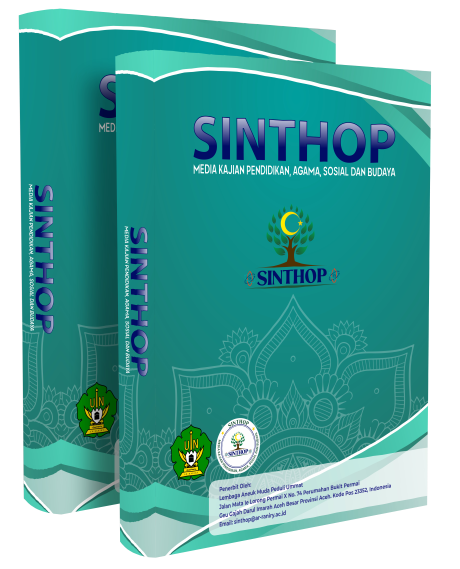The Correlation of Muhkam Verses with Nasikh and Mansukh in Islamic Legal Determination
Abstract
This study examines the correlation between muhkam verses and nasikh wal mansukh in determining Islamic legal rulings. Muhkam verses, characterized by their clear and explicit meanings, and nasikh wal mansukh, referring to the abrogation of certain laws within the Qur'an, are foundational concepts in 'ulum al-Qur'an. The research utilizes a qualitative methodology, involving detailed textual analysis of primary Qur'anic verses and secondary scholarly interpretations. The findings reveal that while muhkam verses provide explicit legal instructions, the principles of nasikh wal mansukh allow for the adaptation of these laws in response to changing social and historical contexts. This dynamic interplay ensures that Islamic legal rulings remain relevant and effective across different eras and circumstances. The study highlights the necessity of understanding the conditions and implications of abrogation in Islamic law and underscores the importance of contextual and scholarly engagement in the interpretation and application of Qur'anic teachings. This comprehensive analysis contributes to the broader discourse on the flexibility and timeless applicability of Islamic law, demonstrating its capacity to address contemporary legal challenges without contradicting core religious principles.
References
Abdul`Al, A. H. (2014). Pengantar Ushul Fiqih, Terj. Muhammad Misbah. Pustaka Al-Kautsar.
Al-Asyqar, M. S. (2018). Ushul Fikih Tingkat Dasar, Terj. Umar Mujtahid. Ummul Qura.
Al-Hamdzani, A. B. M. ibn M. al-H. (1982). al-‘Iltibar fi al-Nasikh wa Mansukh min al-Atsar. Jami’ah al-Dirasat al-Islamiyyah Karatasyi.
Al-Maraghi, A. M. (1969). Tafisr al-Maraghi, Juz I (Cet. 4). Mushthada al-Baby al Halabiwa Auladuhu.
Al-Masyiqi, A. al-F. I. I. K. al-Q. (2000). Tafsir Al-Qur’an al-‘Azhim. al-Maktabah al-‘Ashriyyah.
Al-Munawar, S. A. H. (1994). I’jaz Al-Qur’an dan Metodologi Tafsir. Dimas.
Al-Qathan, M. (1973). Mabahis fi ‘Ulum al-Qur’an, Juz II. Mansyurat Al-Asr al-Hadits.
Az-Zarqani, M. A. A. (n.d.). Manahil al-Irfan fi Ulum alQur’an (01 ed.). Matba’ah Isa al-Babi al-Halabi.
Hasanuddin. (1995). Anatomi Al-Qur’an: perbedaan Qira’at dan pengaruhnya terhadap istinbath hukum dalam Al-Qur’an. PT Raja Grafindo Persada.
Hazm, A. M. ‘Ali bin A. bin. (n.d.). Al-Ihkam fi Ushul Al-Ahkam, Juz IV. Dar Al-Kutub Al-‘Ilmiyah.
Ichwan, M. N. (2002). Studi Ilmu-Ilmu Al-Qur’an. Rasail Media Group.
Kamal, A. A. (n.d.). Ulumul Qur’an. Al-Muhtar al-Islami.
Khallaf, A. W. (1973). Ushul Fiqh. Al-Majelis Al-A’da al-Dawan al-Islamiyyah.
Quththub, S. (n.d.). Tafsir Fi Zhilalil Qur’an,Juz I. Dar al-‘Arabiyah.
Razak, A., & Anwa, R. (2003). Ilmu kalam. Pustaka Setia.
Ridha, M. R. (n.d.). Tafsir Al-Qur’an al-Hakim Juz I, (Tafsir al-Manar). Dar al-Manar.
Saebani, B. A. (2012). Ilmu Ushul Fiqh. Pustaka Setia.
Shihab, M. Q. (1997). Membumikan al-Qur’an, Fungsi dan Peran Wahyu dalam Kehdupan Masyarakat. Mizan.
Syafe’i, R. (2012). Pengantar Ilmu Tafsir. Pustaka Setia.
Syamsuddin, S. (2010). Hermenetika Al-Qur’an dan Hadits. eLSAQ Press.
Syarifuddin, A. (2011). Ushul Fiqh 1. Kencana.
Wafa, M. (1984). Ahkam al-Naskh fi al-Syari’ah al-Islamiyyah. al-Muhammadiyyah.
Zaid, M. (1995). An-Nasakh fi Al-Qur’an Al-Karim, Jilid I. Dar al-Fikr.
Copyright (c) 2024 Syukrinur Syukrinur

This work is licensed under a Creative Commons Attribution-ShareAlike 4.0 International License.
Authors who publish in SINTHOP: Media Kajian Agama, Sosial dan Budaya agree to the following terms:
- Authors retain copyright and grant the journal right of first publication with the work simultaneously licensed Attribution-ShareAlike 4.0 International (CC BY-SA 4.0) that allows others to share the work with an acknowledgment of the work's authorship and initial publication in this journal.
- Authors are able to enter into separate, additional contractual arrangements for the non-exclusive distribution of the journal's published version of the work (e.g., post it to an institutional repository or publish it in a book), with an acknowledgment of its initial publication in this journal.
- Authors are permitted and encouraged to post their work online (e.g., in institutional repositories or on their website) prior to and during the submission process, as it can lead to productive exchanges, as well as earlier and greater citation of published work. (See The Effect of Open Acces)









.png)

.png)
.png)
.png)


